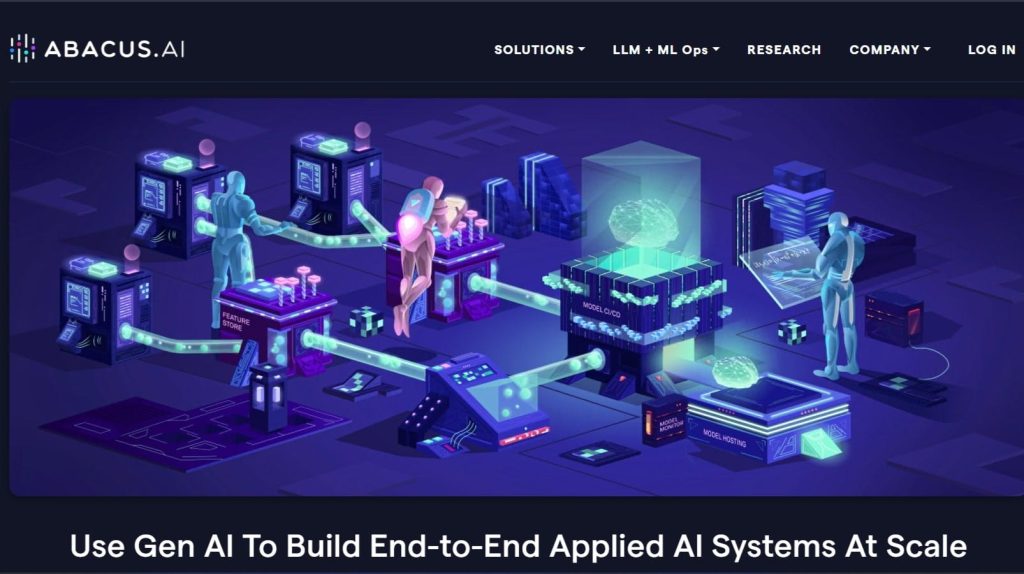What is Abacus.AI?
Abacus.AI is an advanced AI-assisted Data Science platform to offer holistic MLOps capabilities tuned for common enterprise use cases. The platform uses sophisticated AI techniques-also including neural networks-to construct highly accurate models that result in better operational efficiencies and product design. Abacus.AI supports a wide range of AI applications in language processing, anomaly detection, predictive modeling, vision AI, fraud security, and chat LLM. Moreover, it provides real-time machine learning with model monitoring and drift detection to give a holistic view of the data.
Key Features & Benefits of Abacus.AI
Abacus.AI is designed with several features and benefits that make it stand out for a wide range of users. These include:
- Data Science: Rich in tools for managing data science projects.
- MLOps: It manages machine learning operations right from start to finish.
- Neural Networks: High-performance neural network models for accuracy.
- Anomaly Detection: It offers effective anomaly identification in data.
- Predictive Modeling: Accurate forecast and prediction analytics.
- Generative AI Techniques: Automates data processing and model generation.
- Custom Model Training: Ability to build custom models tailored to specific use cases.
- AI-Driven Productivity: Major boosts in the productivity of teams due to automation.
These, when combined, mean that an organization can scale its overall productivity and efficiency, enabling its data science teams to do mission-critical supervision and result reviews of the outcome.
Abacus.AI: Use Cases and Applications
Abacus.AI can be used for many different scenarios and a wide range of industries, including but not limited to:
- Language Processing: Observe and create better natural language understanding and generation.
- Anomaly Detection: The process of uncovering irregularities in data for fraud detection and quality control.
- Predictive Modeling: Predicting future trends and behavior.
- Personalization: Building personalized user experiences from data insights.
- Vision AI: Putting visual recognition and analysis into practice.
Key users of Abacus.AI include data scientists, machine learning engineers, and enterprise MLOps teams-all find it quite robust and able to do a wide variety of AI functions.
How to Use Abacus.AI
Using Abacus.AI is quite simple and consists of the following steps:
- Create Account: You create an account on the Abacus.AI website.
- Select AI Use Case: You decide which AI model you want to use: language processing or predictive modeling.
- Data Integration: Upload your data or connect to your source.
- Model Creation: Creation and training of AI models can be done by availing the different tools on the platform.
- Deployment: Push the models to production.
- Monitoring: Continued monitoring of all models that are live, and making adjustments as needed.
For best results, follow best practices recommendations on the platform like updating your data and models periodically. The real-time monitoring and drift detection features of the platform should be utilized.
How Abacus.AI Works
Abacus.AI is powered by state-of-the-art AI and machine learning technologies, including:
- Generative AI: Leverage advanced AI techniques to automatically build models and process data in the best possible way.
- State of the art neural networks that fire high accuracy models in no time.
- Real Time Machine Learning: With real time data processing and model updating one can be truly assured about the applicability in real world.
- Continuous Model Monitoring: Since they monitor continuously the models will always be up-to-date and accurate.
The general workflow would typically involve data ingestion, choosing appropriate algorithms, training models, deployment, and continuous monitoring and changes for optimum performances.
Pros and Cons of Abacus.AI
Pros
- All-in-one Solution: Covers the whole AI life cycle.
- Productivity Improvement: Huge improvement in productivity of teams.
- Can build and train custom models.
- Advanced Monitoring: Real-time monitoring and drift detection.
Cons
- Steep Learning Curve: It may take some time to understand and get a hold of all its features.
- Cost: Advanced features may be costly for small businesses.
Conclusion about Abacus.AI
Abacus.AI is a strong AI-powered data science platform that meets a wide range of needs an enterprise has. With its extensive MLOps, state-of-the-art neural networks, and real-time monitoring, it is the perfect solution for businesses that want to scale their AI implementations with speed and efficiency. Though the learning curve might be a little steep, the productivity gains and customizability alone make this tool a must-have for data science teams. Future additions will inevitably continue to improve the capabilities of Abacus.AI, making it well worth the investment in any forward-thinking organization.
Abacus.AI Frequently Asked Questions
What is Abacus.AI?
Abacus.AI is an AI-driven platform for building and maintaining a wide range of Applied AI agents and systems for disparate use cases, such as language processing, forecasting, and personalized models.
How does Abacus.AI take advantage of AI on its platform?
Abacus.AI uses generative AI and neural network techniques to automatically process data selection, select the best algorithms, and tune models.
What level of productivity gain for data science teams is possible with Abacus.AI?
Data science teams can realize up to a tenfold increase in productivity by automating the most complex and time-consuming tasks within the machine learning workflow using AI.
What types of solutions does Abacus.AI offer?
Abacus.AI offers a solution to many different types of applications, some of which include but are not limited to language processing, forecasting, predictive modeling, personalization, AI agents, anomaly detection, and many other use cases.
Does Abacus.AI offer any type of free trials or consultations?
In fact, prospective clients can request a free consultation with one of the experts or try the services using the free trial available with Abacus.AI.










